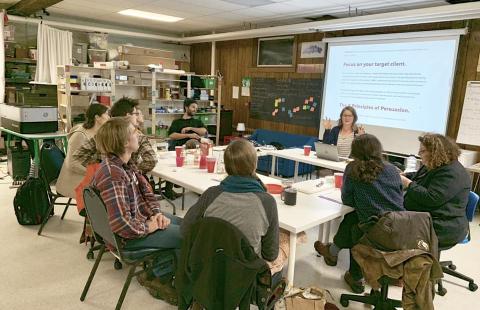What were the specific goals of this creative economy project? Describe the community development challenge or opportunity that your project was designed to address:
WonderArts chose to begin this work with a business incubator/accelerator rather than a makerspace because, while a makerspace would be valuable, there are already many makers in our rural community who had their own space. What was heard loud and clear was that businesses needed access, not to a kiln or a woodshop, but to a large format scanner, a powerful computer, a giclee quality printer, a class on website development, marketing consulting, basic business support, and each other. It wasn’t just artists in need of these resources but farmers, shop owners, architects, engineers, cheesemakers, and more. From this process the goals and objective of Spark were formed:
Create a facility where small and emerging businesses can benefit from having access to high-tech equipment, design software, fiber internet, and technology.
Foster a culture where entrepreneurs and community members come together to ‘incubate’ ideas, learn from each other, and build a network of support.
Support and grow the local economy by providing opportunities and connection to new and existing resources that support small business growth.
Provide workforce development and resilience through workshops, trainings, and one-on-one consulting.
Grow regional retention rates for young people growing up and coming to the Northeast Kingdom.
Engage high school aged students through work-based learning opportunities at spark including internships, education, and connections to professionals in the community.
In July of 2018 spark opened a beta-membership phase bringing 25 individuals and business together to use the space, test systems, lead classes, and evaluate how this project can effectively meet the various needs of entrepreneurs in our rural community. This group represents the diversity of our community by giving a voice to individuals, small businesses, artists, high school students, and professionals in the field. Having evaluated this stage we are thrilled to be opening the next tier of membership in January of 2019.
If the goals change over time, please describe how:
These goals have been developed throughout the past year. We believe that they capture this stage of the project and the attainable outcomes as well as the longer term impacts. We will continue to measure and evaluate goals throughout the project.
Who was involved in this project and what did they do? (be sure to include the partners from outside of the creative sector and how local voices were included):
In the fall of 2017, we brought together over 75 community members together to discuss how a project like this could support our rural economy. Artists, farmers, designers, educators, architects, CEO’s, changemakers, techies, and students brainstormed major barriers to their success and how a project like this would strengthen the economy, creativity, and innovation of our region. From this meeting a core group of stakeholders formed to develop the project. This group includes artists, engineers, techies, students, inventors, teachers, and WonderArts Staff. These stakeholders have worked together to develop systems, research, visit existing projects, develop membership, arrange the space, and more. Since the opening of our beta-phase we have served over 80 people from all around the Northeast Kingdom from age 7 to 90.
How does this project relate to a larger community development strategy?
This project began after years of both community conversation and regional interest in how incubator and co working spaces could boost the rural economy. From a local level all the way up to state-wide there are larger strategies and interest in how we build remote working opportunities in rural Vermont. Partnering with a wide variety of community members and businesses of all sizes has enabled us to gain perspective on all of the different needs of our community.
What projects or places, if any, inspired your approach to this creative economy project?
These days it seems like buzz words like "co-working", "maker space", and/or "business accelerator" are on many creatives minds. We have seen how projects like this have brought life to North Burlington, Rutland, Bradford, and now the Northeast Kingdom. We see our project as a hybrid. Early on we decided that in order to serve our community we had to provide a little bit of everything because no business is at the same stage or in the same sector. We were also inspired by our partnership with the Center for an Agricultural Economies Food Venture Center and how we could provide support not only for artists and entrepreneurs but also farmers and the food industry.
